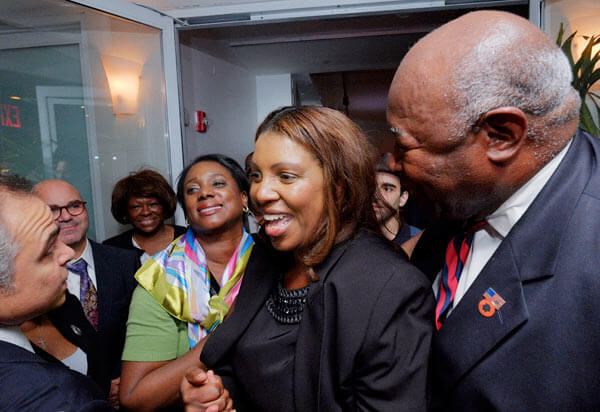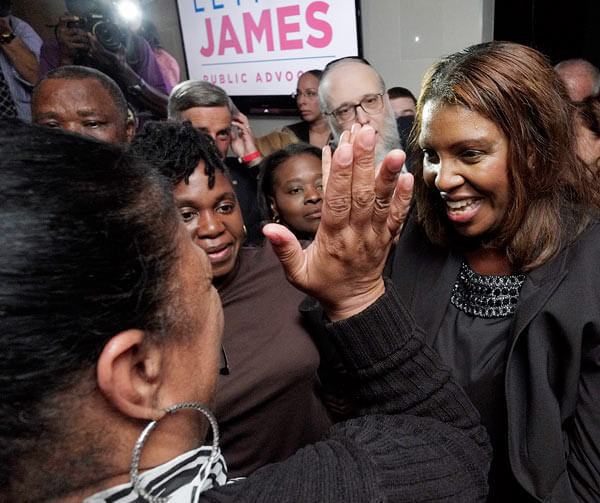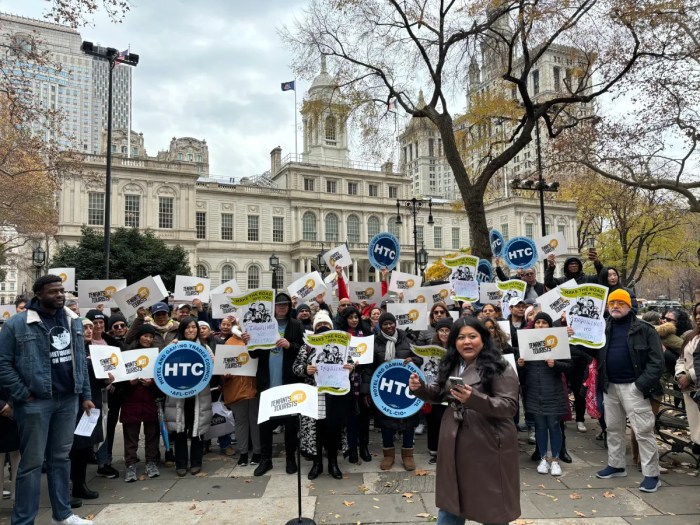By Gerard Flynn
Signaling what may be the beginning of a left-leaning trend in city government, Councilwoman Letitia James (D-Brooklyn) easily defeated state Sen. Daniel Squadron (D-Brooklyn) in the run-off election for city public advocate Tuesday.
In a bitterly fought campaign, James took close to 60 percent of the vote. With no Republican opposing her in the November election, she is on track to be the first woman of color to hold citywide office and will take over the position from mayoral candidate and close friend Bill de Blasio.
A tearful James thanked her supporters and promised as public advocate to be a strong voice for the city’s underserved at the victory party at the Copacabana Club on West 47th Street in Manhattan. She also used her acceptance speech to hit out at congressional Republicans, the NYPD’s stop-and-frisk policy and the department’s surveillance program targeting Muslims.
To raucous cheers and applause, she told the jubilant crowd, “We don’t need any more Bloombergs.”
Squadron, whom James accused of being too close to Bloomberg and real-estate interests, received close to 40 percent of the vote.
In a statement, he congratulated James on her win and said she will be a “great advocate for New Yorkers — without a voice, without high-powered lobbyists, without City Hall on speed dial.”
The public advocate’s office, created in 1993, acts primarily as a watchdog. While it can play a role in shaping government policy, the office has limited powers.
In addition to being second in line to the mayoralty, the public advocate can introduce legislation and has appointment powers. The advocate can also influence city planning, the budget process and the management of retirement funds. The advocate, however, cannot vote in the Council.
Perhaps more importantly, the position is also seen as a springboard to higher office, which may explain why Squadron spent more than $3 million on his campaign for an office with a budget of $2 million. Of the three former office holders, two — Mark Green and de Blasio — have pursued mayoral ambitions while in office.
In addition to drawing blank stares from many members of the public when asked to name the current public advocate, the race drew little media attention until the run-off election.
In recent days, its $13 million price tag drew calls for reform with some critics questioning why run-offs are required for only three offices in the entire state: New York City mayor, public advocate and comptroller. Turnout in the run-off was about 180,000 out of nearly 3 million registered Democratic voters in the city.
While James was heavily backed by organized labor and opposed the extension of terms limits and the controversial Atlantic Yards project in Brooklyn, state Sen. Tony Avella (D-Bayside) endorsed Squadron in the race.
A longtime critic of the often close ties between real estate developers and city politicians, progressive and otherwise, he said the progressive brand has been a calculated hallmark of citywide elections this season.
He expressed doubts that James’ populist rhetoric reflected little more than a “good manufactured image” and did not dovetail with her voting records in the Council.
He said he found Squadron to be “more transparent” and an advocate of good government and affordable housing.
“In City Council, when myself and Charles Barron would oppose some of the city’s projects because of a no affordable housing component, she would get up and say it’s no good, then vote the other way,” he said.
Despite the leftist tone at Tuesday’s celebrations, concerns that a left-leaning de Blasio victory on the heels of James’ win would run the rich out of the city were unfounded, said supporter Alan Schulkin.
Attributing James’ color and gender as being a “major influence” in her victory following Council Speaker Christine Quinn’s (D-Manhattan) defeat, he said James and de Blasio are “too smart” for that.
“While having leftist tendencies, they are not extreme left-wing and will work to keep this tax base in the city,” he said.





































